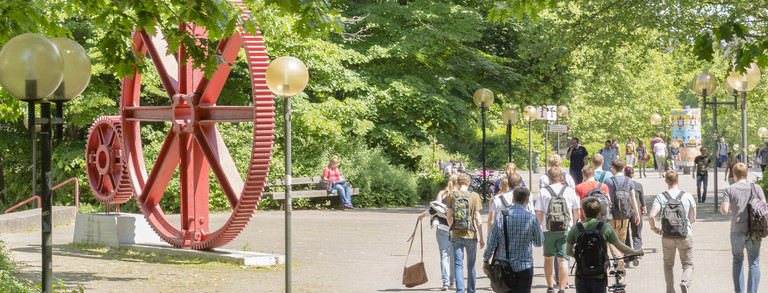Projects
Here you can find information about the ongoing and completed projects of the Senior Professorship Sustainable Mobility.
Current projects
In the joint project "NeMo.bil", an innovative, swarm-like mobility system is being developed and prototyped. Swarms of automated small lightweight vehicles are combined to form a kovoi and thus enable a new form of sustainable and demand-oriented passenger and goods transport in rural areas.
Completed projects
InnaMoRuhr is a multidisciplinary project of the three UA Ruhr universities that are investigating the question of how mobility in the Ruhr region can be made sustainable. The project will develop a concept of integrated, sustainable mobility for the University Alliance Ruhr and test it practically in a field trial.
This project is funded by the Ministry of Transport of the State of North Rhine-Westphalia.
The MoFFa project explores the question of how human-machine interaction in intelligent, (partially) autonomous vehicles can look.
The project was funded by the North Rhine-Westphalia Ministry of Transport.
The ABIDA project examined the societal risks and opportunities emanating from current developments in the field of Big Data. In particular, it focused on the factors of trust, real-time control and technology assessment.
The project was funded by the German Federal Ministry of Education and Research.
The aim of the KoRiSim project was to lay the foundations for cooperative information and risk management in power grids of the future.
The project was funded by the German Federal Ministry of Education and Research. It was carried out in cooperation with the Institute for Energy Systems, Energy Efficiency and Energy Economics at TU Dortmund University and Dortmunder Netz GmbH (DEW21).
In the TraDiLog project, the effects of mechanization and digitalization on mobile work in freight forwarding and logistics companies were investigated.
This project was funded by the Research Institute for Social Development.
The DiscGo project analyzes technology policy decisions related to the phase-out of established technologies (e.g., nuclear power, automobiles with internal combustion engines) in order to gain a better understanding of the governance of the dismantling of socio-technical systems.
The project was funded by the German Research Foundation.
The RisCSIM research project has used computer simulations to investigate how the type of control affects the safety performance of a complex system. This should contribute to a better understanding and analysis of the control and counter role of complex systems such as air traffic, energy systems or road traffic.
RisCSIM was funded by the Fondation pour une Culture de Sécurité Industrielle, touliuse, france.
AktOr is a joint project funded by the German Federal Ministry of Education and Research as part of the "KMU-innovativ" funding directive. It involves the development of a training simulation for faster crisis management.

